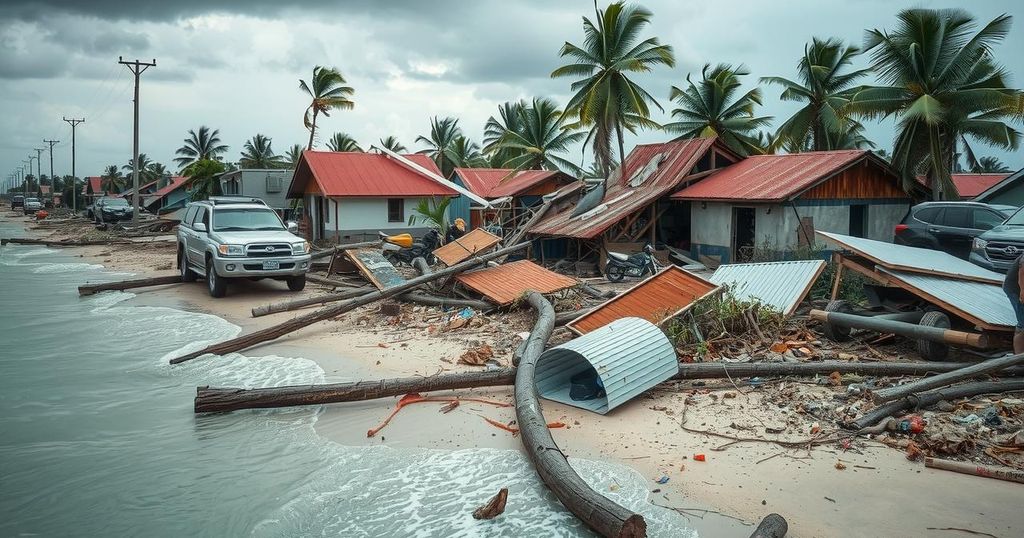Cyclone Chido Devastates Northern Mozambique: 120 Lives Lost and Thousands Affected
Cyclone Chido has resulted in 120 fatalities and 868 injuries in northern Mozambique, affecting over 680,000 people. Significant damage includes over 150,000 homes, 250 schools, and substantial disruption to health facilities and educational services. Emergency shelters have been established to assist displaced individuals, while authorities call for support to facilitate recovery efforts.
Cyclone Chido has wreaked havoc in northern Mozambique, with the death toll escalating to 120 individuals and approximately 868 others sustaining injuries, as reported by the national disaster relief agency. The adverse weather conditions have aggravated the situation, leading to the disruption of over 680,000 lives across Cabo Delgado, Nampula, and Niassa provinces. Despite the comprehensive enumeration of casualties, continued assessments may further illuminate the cyclone’s impact as recovery efforts are implemented.
Having made landfall on December 15, Cyclone Chido unleashed torrential rains and ferocious storms on already vulnerable communities in northern Mozambique. The aftermath has left over 123,000 families, equivalent to around 622,610 people, grappling with severe challenges as the cyclone damaged more than 150,000 homes, displaced numerous families, and disrupted educational institutions, affecting nearly 110,000 students. The situation necessitated the creation of emergency shelters to accommodate the displaced individuals, currently housing 1,349 residents according to recent reports.
Cyclone Chido, which emerged in the southwestern Indian Ocean on December 5, exemplifies the growing concerns surrounding climate change and its repercussions on community resilience in Mozambique. After inflicting damage in Mayotte before heading towards Mozambique, the cyclone highlighted the vulnerabilities in social infrastructures. The National Institute for Disaster Risk Management and Reduction (INGD) noted in a social media update that “the Cyclone Chido once again highlights the vulnerability of social infrastructure to climate change and the need for resilient planning to mitigate future impacts.”
International organizations and local authorities continue to rally for assistance to address the pressing needs of affected communities, emphasizing the urgent need for resources to facilitate recovery and rebuild damaged infrastructures. As the recovery process unfolds, the importance of addressing climate change and building resilient systems becomes increasingly apparent to prevent future tragedies.
Cyclones are severe storms characterized by rotating winds, often resulting from tropical depressions. They can cause catastrophic damage, particularly in coastal regions, where they can lead to flash floods and massive infrastructure destruction. Mozambique has a historical vulnerability to cyclones and extreme weather events, which have increasingly intensified due to climate change. Cyclone Chido’s ramifications illustrate the critical need for effective disaster management and climate adaptation strategies, particularly for infrastructure that supports vulnerable populations.
In summary, Cyclone Chido has tragically taken 120 lives and inflicted widespread injury and displacement among communities in northern Mozambique. The devastation highlights the urgent necessity for improved infrastructure resilience and climate adaptation measures to protect populations from future disasters. As recovery efforts commence, continued support from national and international organizations will be vital in alleviating the suffering of affected families and rebuilding essential services.
Original Source: english.mathrubhumi.com




Post Comment